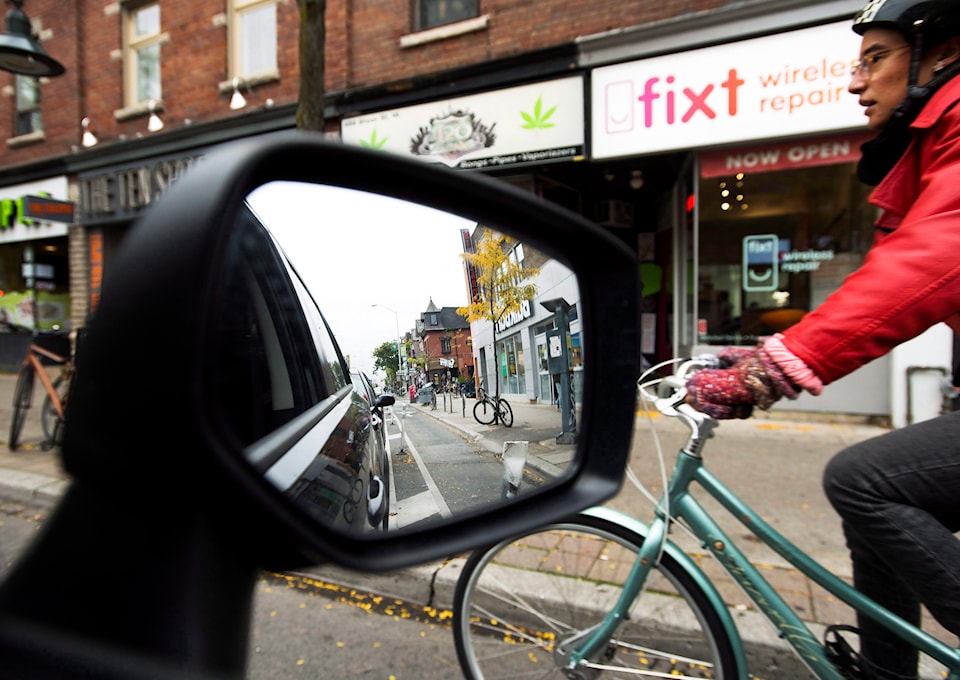The Ontario government passed its law to rip out bike lanes from major streets.
Bill 212, the Reducing Gridlock, Saving You Time Act, 2024, was adopted on Monday, which calls for the removal of bike lanes from major arteries like Bloor and Yonge Streets, and University Avenue. The new bill requires future bike lane projects that reduce car lanes to receive provincial approval.
For many, the issue goes beyond the debate on traffic flow.
Andre McEvenue, who uses Toronto's bike lanes daily, joined the protest at Queen’s Park on Nov. 23, organized by Fight for Bikes.
"I'm here because I don't want to see the bike lanes disappear that I use every day," McEvenue said. "If they do, I'll have to find other modes of transportation because I don't feel safe riding without them."
McEvenue said how dangerous roads can get without bike lanes.
"Yeah, I've actually been hit by cars three times, and in all of those cases, I was on a road with no bicycle infrastructure. I was riding correctly and safely and did nothing wrong," he said.
He said the lack of bike lanes forces cyclists and cars into dangerous conflicts.
"Cars and cyclists end up in conflicts because it’s not a safe condition for people on bicycles," he said.
Fight for Bikes and other advocacy organizations have opposed the law, claiming that bike lanes are essential to create safer, more environmentally friendly streets. The City of Toronto report mentions that the introduction of separate bike lanes resulted in a 38 per cent decrease in injury collisions involving cyclists.
Additionally, there has been an increase in customer traffic to businesses along bike lanes.
Another study suggests bike lanes increase retail spending and reduce vacancy rates.
However, the provincial government thinks eliminating bike lanes from busy streets will ease traffic, improve car efficiency and boost business. The solution to improved traffic flow will be to increase the number of car lanes.
For people like Manpreet Singh, an Uber delivery driver who bikes around the city every day, the removal of bike lanes is more than just a traffic issue. It’s a threat to his livelihood.
“The changes will hurt my ability to deliver quickly, making it difficult for me to earn more,” he said.
“With bike lanes gone, I’ll be stuck behind traffic for longer, and the delivery times will increase. That means fewer deliveries per hour and less money in my pocket,” Singh said.
Singh, who has experience in biking through Toronto’s winters, says working without bike lanes will make things even worse for safety.
“This is a bad timing,” Singh said.
“Winter in Toronto is already tough for biking, roads have ice and heavy snow makes my ride risky and slippery," he said. "Without bike lanes, it will be more dangerous and will make my job even harder.”
The debate about the future of bike lanes in Toronto continues despite the legislation. McEvenue, who is concerned about the political implications of the bill, said he does not have high hopes for its reversal.
"I'm not that hopeful because I think the provincial government is making a calculated political move," he said.
"I don't think they care about anything that we're saying today," McEvenue said. "But I’m hopeful that this movement will start to make waves to help vote out this government in the next election."
The new law is a reversal of positions Premier Doug Ford had taken in the past. He suggested in 2014 that the city needs more bike lanes. In an X post (formerly Twitter), he said, “We need both bike lanes and bike paths from one end of the city to the other. We need to protect bicycle riders.”
Ford posted in 2017 that bike lanes should be built where they make sense.



